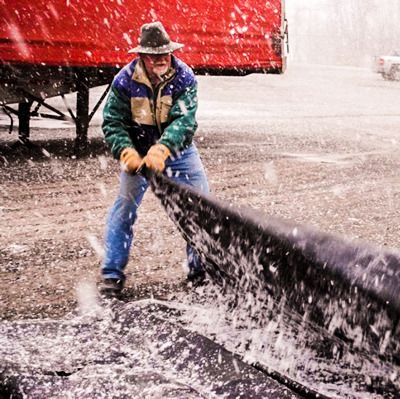How To Get Yourself Dispatched 5,000 Miles In One Week
-
Blogs By Author
-
Blogs By Tag
Editor's Note:
As a new driver, your main concern should be learning how to become a safe, productive driver. The steep learning curve of truck driving may mean that you're not getting a ton of miles, or not as many as you'd hoped, especially during the first six months.
The following was taken from a recent forum discussion by one of our moderators, Old School.
Old School's recent experience is a perfect example of how a top-tier driver, who is experienced, patient, confident, and who has built great relationships with his team, can regularly get dispatched as many miles as is physically and legally possible.
Old School put himself in a position, through superb planning and raw initiative, to get dispatched on loads totaling over 5,000 miles in one week. Now, there's no physical way that he could actually drive those 5,000 miles in a single week, but the payoff for his initiative and planning skills is an extra 700 miles per week.
See below: Victor asks "How do I know when it's okay to take that much initiative upon myself?"
Original Discussion: How To Get Yourself Dispatched 5,000 Miles In One Week
Well, that's what happened to me this week!
It happened simply because I practiced some time proven principles that make for success out here. Here's the story of how this fell into my lap:

I came off of four or five days of home time over Mother's Day weekend and went back to work early Wednesday morning. I had a 2,200 mile load dispatched to me from Delhi, Louisiana to Hermiston, Oregon - not too shabby! It had a problem with it though - I can't get it there Friday, and the notes from CSR say they are not available Saturday to unload me. This is a job site where we are delivering some aluminum stadium seating, and it looks like I will just have to take my time and get it there first thing Monday.
Always one to try to make my own opportunities out here, I do a little research, find out the job superintendent's cell number, and give him a call - well, actually three calls, until I can get hold of him and talk. I simply tell the man that I can be there Saturday morning if there is any way they can unload me. He is happy to do it, and tells me that they are not actually working that day because they don't have the materials they need, but they will just be sitting around at their hotel, and if I call him when I'm getting close, he will meet me at the site and unload me.
Next thing I do is make a call to the folks in Phoenix, Arizona who help us find backhaul loads for this dedicated account that I am serving. Usually I would just call my dispatcher in Louisiana and let him know that I had moved my appointment and he would handle the details, but he is out this week on vacation. I don't even want to bother the stand-in, who really doesn't have a clue about how things work on this account. I'm really not supposed to call the folks in Phoenix, but when I explained to them what was going on, they thanked me for calling and said they would get right to work on finding me something for Saturday instead of Monday. It is critical on this account that we get back to Louisiana as quickly as possible so we can be dispatched onto another outgoing load from the manufacturing plant.
Somewhere during my last six hundred mile leg of the trip to Hermiston, I got dispatched a pre-plan back haul load which has 2,800 miles on it!

Now I can't legally drive 5,000 miles in one week, but consider this: Had I just taken my time and gotten this load there on Monday, I would turn it in on Tuesday's cutoff for payroll. I would have a 2,200 mile paycheck. Then if I got the same backhaul (which is unlikely), I would have taken it by its schedule and I would have my next week be a 2,800 mile paycheck. That's not bad, but neither is it impressive. I would have averaged 2,500 miles per week those two weeks. Many people are satisfied with that.
By doing what I did, I have got a big jump start on the next week's pay period. Being familiar with this account and how it works, I can almost guarantee you what will happen when I finish this 2,800 mile run. I will be given a load to Connecticut with 1,400 miles on it that I can deliver just in time for the next payroll cutoff. So now let's do the math again... Three loads delivered in two weeks time with a total of 6,400 miles turned in. Now I have averaged 3,200 miles for those two weeks, just by taking some initiative of my own. When you do these types of things consistently, you are really increasing your pay. You don't have to get a pay raise to make more money, you just have to understand how to play the game out here.
Here are the three important things I did...
- I moved my appointment time forward by making a few calls and presenting myself in a professional way to the customer.
- I knew who to call at my company that would do what they could to keep me moving, and got them on the same page with me.
- I followed through and did what I said I would do - no excuses, just "git er done."
I tell people all the time that this job is more like being self-employed than any other you can have. Here's what successful self-employed people who are their own boss do:
- They seize every opportunity that is given them, and then on top of that they are vigilant about making their own opportunities happen whenever possible. That is what I did this week, and to be honest with you I'm on the hunt for opportunities each day that I am out on the road.
- You need to be an opportunist to make stuff happen out here, and when the people that you work with understand your abilities, they will be right in there to support you. They recognize the kind of drivers who are consistently getting more accomplished, and they are more than willing to get behind that kind of driver with their support.
- You have got to be consistent at this, so don't over extend yourself and start messing things up. Learn your craft and build upon a good foundation. If you drop the ball too many times you will lose their trust, and that will cost you.
Knowing the log book rules, managing your time efficiently, and being willing to make a few sacrifices that other drivers may not are key factors in being a top tier driver. Taking your own initiative and producing consistent results are key ingredients to success out here.
Victor has a rookie concern:
Thanks Old School I think I am going to take your advice! I have been driving solo for a week and today was the first time that I actually got to the reciever a whole day early! Happy happy happy. I did 1934 miles then a couple 200-300 mile runs and now my 3rd 300 mile run. It pays off to also let the dm know if you are having trouble getting to where you are supposed to be.
Now though, I do say I have a question, what if a pay person told me that I could get a "service failure" if I call or if the special comments say the same? What should I do in that scenario? Should I still call or should I just free form my DM and let them know I am going to be early?
Old School Responds:
Victor, as a rookie, I took those notes pretty seriously, and I would recommend that you do the same. It took me about six months before I felt confident enough to start moving my appointments when there were notes advising me not to. What you want to do right now is work on communicating effectively with your dispatcher. That is a critical part of learning to be successful at this.
Now, all dispatchers are not equal, and you may eventually find that you can be more effective with your own efforts, but as a rookie, start out learning to let your dispatcher know ahead of time that you will be early and see if they get the hang of helping you keep moving.
Remember that you are an unproven driver to them, and they have had a lot of bad experiences with unproven drivers before you. Just keep practicing your methods of getting there early and notifying dispatch of what you will do - just be sure that you can always follow through with what you are telling them. That is how you establish yourself as dependable, reliable, and trust worthy.
Eventually your dispatcher should start helping you keep moving in a good way. If after six months or so you discover that your dispatcher may not be on the ball as much as you would like them to be, then you can start trying some tricks of your own to keep yourself moving.
This is a learning process, especially for you at the beginning of your career. Also, you need to realize that I am in a special position to work these kind of things out. For one thing, I am pulling flat-bed loads, and I do believe it is easier to move things forward with these types of loads and customers. The other thing is that as a dedicated driver a lot of my customers get to know me, and that in itself helps a lot out here when trying to get more done.
Take your time as you develop your strategies for success. You don't want to step on any toes just yet in your eagerness to achieve success. The key relationship you need to work on right now is the one with your dispatcher. They have the power to really help you or hinder you. One of the most important things you want to establish right now is a relationship that causes that dispatcher to fully trust you and rely on you.
Go get em! If you can get somewhere early, then let your dispatcher know well in advance, and do it. I had plenty of times as a beginner where I would actually get in a 34 hour reset while waiting to deliver. Sounds crazy, but I would gain more available hours, and eventually my dispatcher figured out I knew what I was doing and then started getting me set up better so that we could utilize my time better, and optimize the efficiency of my truck. Once that starts happening, the sky is the limit. Take those baby steps faithfully and carefully, and soon you will be running with the "Big Dogs."
Related Articles:







 TT On Facebook
TT On Facebook